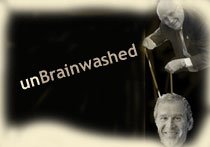The People's Economist
(Forum Topic at The Blue Republic
John Kenneth Galbraith,liberal economist, died on Saturday at the age of 97...(continued)...
Reuters:
"The Canadian-born economist, one of the towering economic thinkers of the century, often found himself at odds with the mainstream ideas of the day but delighted in his stubborn defense of principle.
A lifelong Democrat, Galbraith saw the widening gap between the richest and the poorest as a threat to economic stability and a "moral crime," said Parker, author of "John Kenneth Galbraith : His Life, His Politics, His Economics."
Galbraith's best-selling work, "The Affluent Society," published in 1958, advocated large government investment in parks, transportation, education and other public amenities to narrow disparities between rich and poor.
"John Kenneth Galbraith was a brilliant economist and writer and a great friend of the United Kingdom and his books will be widely read in generations to come," British Finance Minister Gordon Brown told Reuters.
An early opponent of the Vietnam War and outspoken critic of supply-side economics which dominated the 1980s, Galbraith taught for more than a half a century at Harvard University where few colleagues -- with the marked exception of Henry Kissinger -- had as much influence on American policy.
He was heavily influenced by British economist John Maynard Keynes, who advocated government spending to reduce unemployment. Galbraith, who often described himself as an "evangelical Keynesian," supported a much shorter work week, the women's liberation movement and an international council to help the victims of man-made disasters."
"A lanky giant who stood 6 feet 8 inches (200 cm) and often stooped before audiences, Galbraith had a rare ability to reduce complex economic theory to a level understood by the man in the street.
After the Dow Jones Industrial Average's 1,500 point climb to break the 6,500 mark in November 1996, Galbraith remarked to Reuters: "There is too much money chasing too little intelligence to manage it. It can't last."
Galbraith remained a proponent of traditional Democratic ideals even as they came to appear shrill and out of step.
"Consigning the least fortunate of our people to the neglect and despair that a purely individualist society prescribes ... is not, I submit, a sound conservative strategy," he said in his 1986 book, "A View from the Stands."
John Kenneth Galbraith was born Oct. 15, 1908, on a farm in Ontario, Canada. He received a science degree from the University of Toronto in 1931 and three years later earned a doctorate in economics at the University of California.
His life at Harvard began as a tutor in 1934 but three years later he moved to Cambridge University, England, on a fellowship. Galbraith married the former Catherine Atwater in 1937 -- the same year that he became a U.S. citizen.
They had three sons. His wife and two of his sons were by his side when he died, said Parker.
He taught economics at Princeton University in 1939 and 1940 and in 1941 joined the Office of Price Controls. Later, Galbraith said, his office had started with no price controls and by 1943 almost every price was under control.
In 1949 Galbraith received his appointment as an economics professor at Harvard. He was a close friend and early supporter of President Kennedy, who named him ambassador to India from 1961 to 1963, the only years he did not spend at Harvard.
Galbraith also wrote speeches for two other Democratic candidates for the presidency, the late Adlai Stevenson in 1952 and 1956, and Sen. George McGovern in 1972."














11 comments:
and yet Milton Freidman continues to live, there is no god
Well they were fond of each other, even if adversaries!
This country has been hurting for bigger government for some time. I feel that we shall see it again come 2008, less out of want then need.
Well Galbraith certainly was a fan of government with a large pervasive role- but the question is about how the government is permittted to fulfill that role. What many want is more accountability, more efficiency. Less redundant bureaucracy. Less waste. The trouble with big government is its seeming inability to self correct.
What struck me most about Galbraith was his sense of justice though and the futility of wasteful consumption. Over the years, much of his writing about consumption, though disputed by the likes of Friedman, have stayed with me. His thinking led me to other writers on consumption like Kunstler. His ideas changed minds, attitudes.
Now my knee jerk reaction was that you were being sarcastic spooky but I am answering as though that was not the case.
Don't know a lot about the guy but it sounds like he espoused many of the same ideas I hold to be true. RIP
Some JKG quotes, I like:
"The study of money, above all other fields in economics, is one in which complexity is used to disguise truth or to evade truth, not to reveal it. The process by which banks create money is so simple the mind is repelled. With something so important, a deeper mystery seems only decent."
“Faced with the choice between changing one's mind and proving there is no need to do so, almost everyone gets busy on the proof.”
“There is certainly no absolute standard of beauty. That precisely is what makes its pursuit so interesting.”
“The modern conservative is engaged in one of man's oldest exercises in moral philosophy; that is, the search for a superior moral justification for selfishness.”
“We all agree that pessimism is a mark of superior intellect.”
“The only function of economic forecasting is to make astrology look respectable.”
“We are becoming the servants in thought, as in action, of the machine we have created to serve us”
“It is not necessary to advertise food to hungry people, fuel to cold people, or houses to the homeless.”
“The man who is admired for the ingenuity of his larceny is almost always rediscovering some earlier form of fraud. The basic forms are all known, have all been practiced. The manners of capitalism improve. The morals may not.”
“The contented and economically comfortable have a very discriminating view of government. Nobody is ever indignant about bailing out failed banks and failed savings and loans associations. But when taxes must be paid for the lower middle class and poor, the government assumes an aspect of wickedness.”
“What is called a high standard of living consists, in considerable measure, in arrangements for avoiding muscular energy, for increasing sensual pleasure and enhancing caloric intake above any conceivable nutritional requirement”
“There are times in politics when you must be on the right side and lose.”
Galbraith? Who?
Its amazing, seriously, how many informed liberals don't even know about this man. A damn shame. All people should know about Galbraith.
Under his theories, America was prosperous for all, under Freidman's, America is only prosperous for a tiny percentage. Which is more akin to democracy?
Galbraith stands above all the other economists of our time. I remember most of his work from college and grad school readings. He was not the first to skewer the lifestyle of the rich and famous, Thorstein Veblen wrote about the conspicious consumption of the leisure class. His idea of countervailing power as a prerequisite for economic balance is sorely missing from the political agenda right now. J.K. Galbraith stood by his principles and did not vow to political pressure no matter how the political winds change direction. He was also quick and witty in pointing out the mumbo-jumbo of monetary economists who confuse sophisticated models with the reality of economic life. I wish there were more economists like him who did not prostitute themselves to politicians and businessmen.
What a great site projector headlights 2000 mustang patent info Chevrolet cam bearing installation instructions Hair loss treatment propecia hair loss treatment w Replace concrete driveway
Post a Comment